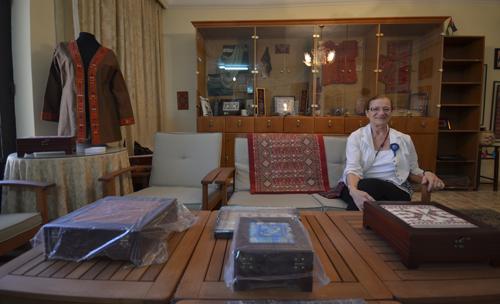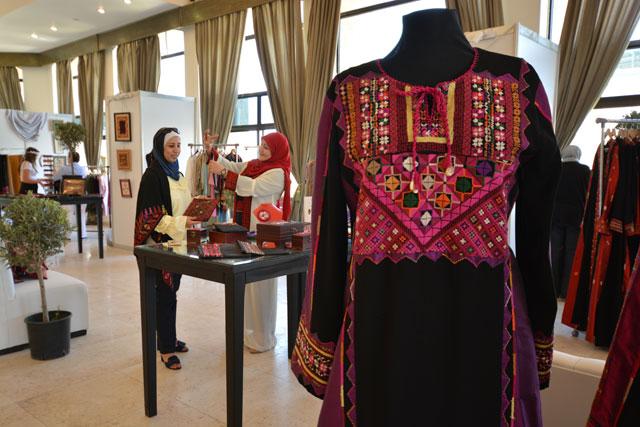You are here
Embroidery expert seeks to preserve Palestinian style for future generations
By Muath Freij - Oct 14,2015 - Last updated at Oct 14,2015

Siham Abu Ghazaleh is surrounded by products that incorporate traditional Palestinian embroidery at the Palestinian Cultural Centre in west Amman's Rabiah area on Wednesday (Photo by Muath Freij)
AMMAN – After Israelis forced Palestinian families to leave their homes in 1948, many Palestinian women in the refugee camps resorted to selling their traditional dresses in order to meet their families’ needs, Siham Abu Ghazaleh recounted.
Seven years old at the time, Abu Ghazaleh was then unaware of the value of these Palestinian dresses, but as an adult she became convinced of their cultural importance.
“I remembered that many Western women bought the dresses from Palestinian women at cheap prices because the Westerners knew their value and significance. At the time, Palestinians were occupied with meeting basic survival requirements and no one was aware of the need to preserve Palestinian identity,” she told The Jordan Times in an interview at the Palestinian Cultural Centre in west Amman’s Rabiah area on Wednesday.
Abu Ghazaleh, head of the heritage committee and exhibitions at the centre, has dedicated her life to learning and preserving Palestinian embroidery, attaining great experience in the field.
Describing her initial efforts to research this subject, she recalled: “I depended on books and started meeting women who knew about these dresses to get further information. We did not learn about our country in school because they taught us about the French revolution and about England and Europe instead.”
After she moved to Kuwait, Abu Ghazaleh joined the Palestinian Women’s Association, and she has been in charge of its cultural committee since the 1970s.
“Traditional Palestinian dress was not used in Kuwait, so we started holding fashion shows to raise people’s awareness regarding this style of dress. The first event was held at my house in 1976. Following our events, women started wearing these dresses to weddings and social events,” she said.
Due to the success of these events in Kuwait, the association began holding its fashion shows abroad.
Abu Ghazaleh settled in Amman during the 1990s and noticed that many Palestinian women with great experience in embroidery had also moved to Jordan following the Iraqi invasion of Kuwait.
“There were around 750 women who knew embroidery, and that was a great motive for me to stay in Amman and look after them. I wanted the process to be ongoing.”
Abu Ghazaleh, a mother of four and grandmother of eight, said traditional Palestinian dresses were mainly worn in rural areas.
“Palestinians residing in the cities used to buy the dresses and take pictures with them,” she added with a smile.
She stressed that the Palestinian community is a rural society, but more than 400 villages were destroyed following the Israeli occupation.
Abu Ghazaleh, who has an MA in embroidery, described the Palestinian dress as the “language” that each Palestinian city or town uses to convey its identity, culture and history.
“For example, Jaffa’s dress features the shape of a water wave because it has a harbour, which was among the most important harbours in the world.”
She noted that a country that has no identity has no people, and this is why it is important to instill a passion for culture and heritage in the generations to come.
“Israelis stole items of cultural significance to Palestinians and pretended that these works were theirs. Due to the weakness of Arab and Palestinian media outlets, people around the world believed the Israeli narrative and thought that Palestinians had nothing.”
Describing herself as having roots all over Palestine, Abu Ghazaleh was born in Jaffa and lived in Nablus, her hometown, and Jerusalem.
Recently, she has witnessed women of Palestinian descent starting to teach their daughters the basics of embroidery
“My children and grandchildren help me with the exhibitions and they are really interested in Palestinian identity. Palestinians have great patience. We learned from working on the land and this is the base of our resistance.”
Related Articles
AMMAN — The Palestinian Culture Centre on Tuesday opened its eighth annual Cultural Exhibition featuring a number of culturally significant
AMMAN –– Young Palestinians are becoming more interested in their heritage, and are joining their mothers in embroidery work, an official at
AMMAN — The 10th Palestinian Cultural Centre Exhibition, showcasing Palestinian culture, local cuisines and many activities and events will













